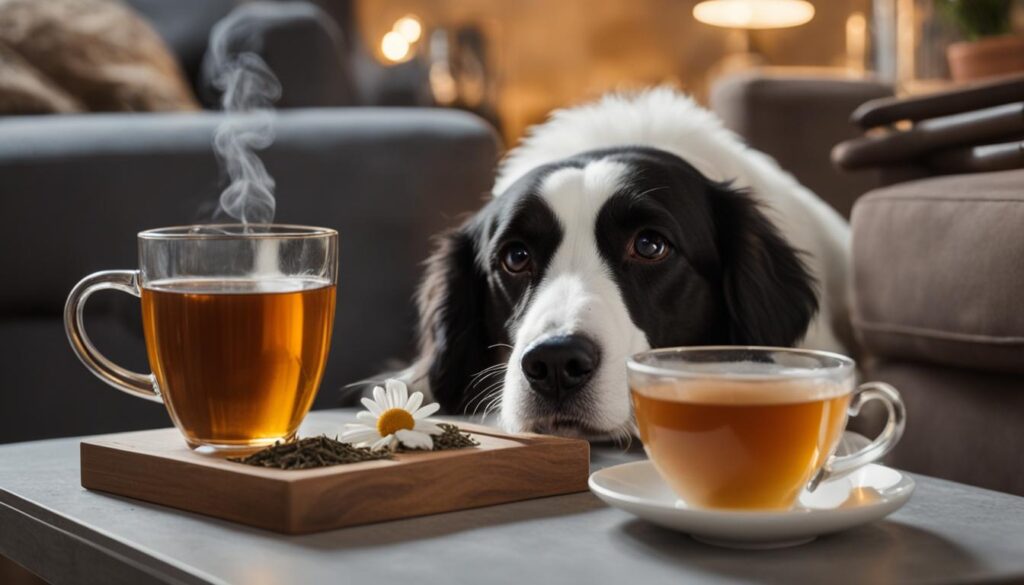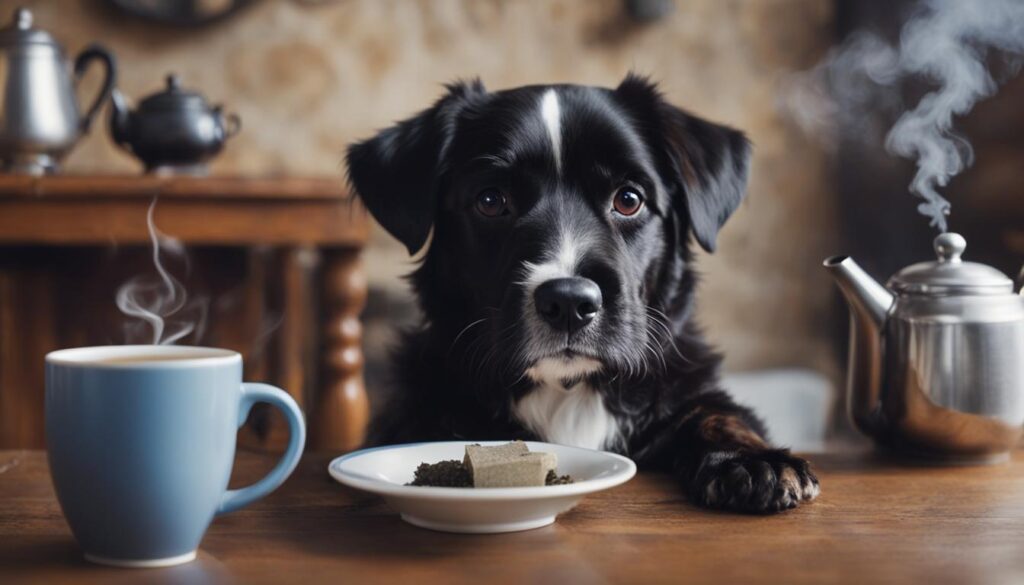As a responsible pet owner, it’s natural to wonder about what foods and drinks are safe for your furry friend. One common beverage that often comes to mind is tea. Can dogs have tea? Is it safe for them to consume? In this article, I will address these questions and provide valuable insights for dog owners like you.
When it comes to tea, it’s crucial to understand that not all types of tea are created equal when it comes to dogs. While some herbal teas can offer potential health benefits for our four-legged companions, other varieties may pose risks due to their caffeine content or other harmful ingredients.
Before diving into the details, it’s important to note that every dog is unique, and what works for one may not work for another. Consulting with a veterinarian is always recommended to ensure the well-being of your furry friend.
Key Takeaways:
- Caffeine-free herbal teas can be safe for dogs in small quantities.
- Consulting with a veterinarian before giving tea to your dog is essential.
- Avoid teas that contain caffeine, as it can be toxic to dogs.
- Several herbal teas, such as chamomile and ginger tea, may offer potential benefits for dogs.
- Always choose caffeine-free and sugar-free options for your dog’s safety and well-being.
Can Dogs Drink Tea?

As pet owners, we often wonder if it’s safe to share certain foods and beverages with our furry friends. When it comes to tea, the answer is not always straightforward. Herbal teas without toxic ingredients like caffeine or chocolate are generally safe for dogs to drink in small amounts. However, it’s crucial to check with a veterinarian before introducing any new food or drink into a dog’s diet, including tea.
While some herbal teas can offer potential health benefits for dogs, it’s important to understand which varieties are safe and which should be avoided. Consulting with a veterinarian ensures that you make the best decision for your dog’s health and well-being.
Here are a few important factors to consider when it comes to dogs and tea:
- Safe Herbal Teas: Certain herbal teas like chamomile, peppermint, lavender, raspberry leaf, and dandelion are generally considered safe for dogs in small quantities. These teas can have calming, soothing, and digestive benefits for dogs.
- Avoid Caffeine and Chocolate: It’s crucial to avoid teas that contain caffeine or chocolate, as these can be toxic to dogs. Caffeine can cause restlessness, rapid breathing, muscle tremors, and other serious health issues in dogs.
- Consult Your Veterinarian: Before giving tea to your dog, consult with a veterinarian to ensure it’s safe and appropriate for your dog’s specific health needs. They can provide guidance on suitable teas and advise on the ideal quantity your dog can consume.
Quote:
“While herbal teas without toxic ingredients are generally safe for dogs in small amounts, it’s important to remember that each dog is unique. Consulting with a veterinarian is the best way to ensure the safety and well-being of your furry friend.”
Remember, dogs have different sensitivity levels and dietary restrictions, so what may be safe for one dog might not be suitable for another. When it comes to giving tea to dogs, moderation is key. It’s recommended to start with small amounts and monitor your dog for any adverse reactions or changes in behavior.
Ultimately, providing alternative, dog-safe treats and consulting with a veterinarian are recommended for a pet’s overall health and happiness. Together, we can make informed choices and prioritize the well-being of our beloved canine companions.
Is Ginger Tea Safe for Dogs?

Ginger tea can be a beneficial and safe beverage for dogs when given in moderation. Ginger contains anti-inflammatory properties and can help soothe an upset stomach. While it is generally considered safe, it’s essential to provide ginger tea to dogs in small doses and consult with a veterinarian before including it in their diet.
Benefits of Ginger Tea for Dogs
Ginger tea offers several potential benefits for dogs’ health:
- Anti-inflammatory properties: Ginger can help reduce inflammation in the body, making it useful for dogs with arthritis or joint pain.
- Settling an upset stomach: The anti-nausea properties of ginger can alleviate digestive discomfort in dogs, such as vomiting or diarrhea.
- Promoting healthy digestion: Ginger tea can stimulate digestion and improve nutrient absorption in dogs, aiding their overall digestive health.
- Providing antioxidants: Ginger contains antioxidants that can help support a dog’s immune system and protect their cells from damage caused by free radicals.
While ginger tea can be beneficial for dogs, it is crucial to give it to them in moderation. Too much ginger may lead to digestive upset or other adverse effects. As with any new addition to a dog’s diet, it is recommended to consult with a veterinarian before giving ginger tea to dogs, especially if they have any pre-existing health conditions or are taking medication.
Preparing Ginger Tea for Dogs
To prepare ginger tea for dogs, follow these simple steps:
- Peel and grate a small amount of fresh ginger root. Aim for approximately a 1/4 to 1/2 teaspoon of grated ginger per cup of water.
- Boil a cup of water and add the grated ginger.
- Let the mixture simmer for about 5 minutes to allow the ginger’s flavors and beneficial compounds to infuse into the water.
- Remove the tea from heat and let it cool down to room temperature.
- Strain the tea to remove any ginger pieces.
- Offer the cooled ginger tea to your dog in small amounts. Start with just a few tablespoons and observe their response before increasing the dosage.
It’s important to note that while ginger tea is safe for dogs, other ingredients commonly used in human tea recipes can be harmful to them. Always ensure that the ginger tea you serve is free from any additives, such as caffeine, sugar, or artificial sweeteners, which can be toxic to dogs.
| Ginger Tea Recipe for Dogs | Ingredients | Instructions |
|---|---|---|
| Ginger Tea |
|
|
Should Dogs Drink Sweet Tea?
Sweet tea may be a popular beverage for humans, but when it comes to dogs, it’s best to steer clear. Sweet tea often contains caffeine and high levels of sugar, both of which can be harmful to our furry friends.
The dangers of sweet tea for dogs are twofold. Firstly, caffeine found in sweet tea can have various negative effects on dogs, including restlessness, rapid breathing, and muscle tremors. These symptoms can be distressing for our beloved pets and may require veterinary attention.
In addition to caffeine, the high sugar content in sweet tea can lead to weight gain and dental problems in dogs. Just as excessive sugar consumption can be detrimental to our own health, it can have similar consequences for our canine companions.
As responsible pet owners, it’s important to prioritize our dogs’ well-being and choose safer alternatives to sweet tea. Opting for refreshing, non-caffeinated options such as plain water or dog-friendly herbal teas can provide hydration without the potential harm.
Certain herbal teas, like chamomile or peppermint, can even offer additional benefits for dogs. These teas have calming properties, soothing upset stomachs and promoting relaxation. However, it’s crucial to consult with a veterinarian before introducing any new food or beverage into your dog’s diet, including herbal teas.
Quotes:
“Sweet tea may be tempting to share with our furry friends, but the potential risks outweigh the benefits. It’s best to stick to safe and healthy options when it comes to beverages for dogs.” – Dr. Amanda Roberts, Veterinarian
Dangers of Sweet Tea for Dogs:
| Concerns | Effects |
|---|---|
| Caffeine | – Restlessness – Rapid breathing – Muscle tremors |
| Sugar | – Weight gain – Dental problems |
When it comes to our furry friends, it’s always better to be cautious and choose beverages that are safe and beneficial for their health. While we may enjoy sweet tea ourselves, it’s important to remember that dogs have different dietary needs and sensitivities. By avoiding sweet tea and opting for healthier alternatives, we can ensure that our dogs stay happy, hydrated, and healthy.
The Health Benefits of Tea for Dogs

Tea can offer various health benefits for dogs, including boosting their immune system, aiding digestion, and promoting a healthy skin and coat.
One of the key advantages of tea for dogs is its antioxidant properties. Tea contains natural antioxidants that can help strengthen the immune system and protect against free radicals. These antioxidants can improve a dog’s overall well-being and support their immune response to common health issues.
Moreover, the polyphenols found in tea are beneficial for a dog’s digestion. These compounds can aid in the breakdown of food, improve nutrient absorption, and reduce inflammation in the digestive tract. This can help alleviate gastrointestinal discomfort and promote a healthy digestive system in dogs.
Tea can also contribute to a dog’s skin and coat health. The antioxidants in tea can help reduce oxidative stress, which can lead to improved skin condition and a shinier coat. Additionally, some herbal teas, such as chamomile and lavender, have calming properties that can help soothe irritated skin and promote a healthy coat in dogs.
It’s important to note that while tea can provide these benefits to dogs, its effects may not be as significant as they are in humans. Dogs have different metabolic systems and may not respond to tea in the same way. Therefore, it’s essential to offer tea as part of a balanced diet and consult with a veterinarian for specific recommendations based on your dog’s individual needs.
In summary, tea can be a beneficial addition to a dog’s diet, offering immune-boosting properties, aiding digestion, and supporting skin and coat health. However, it’s crucial to consult with a veterinarian before introducing tea to your dog’s routine to ensure their safety and well-being.
Can Dogs Drink Chamomile Tea?

Chamomile tea is a popular herbal remedy known for its calming and soothing properties. But can dogs drink chamomile tea? The answer is, yes, dogs can consume chamomile tea in small quantities.
Chamomile tea for dogs has become a popular natural remedy to help calm anxious dogs and promote relaxation. The tea is believed to have sedative effects on the nervous system, making it an ideal choice for dogs with anxiety or stress.
When giving chamomile tea to dogs, it’s important to remember that moderation is key. Just like with any new food or drink, it’s always best to consult with a veterinarian before introducing chamomile tea into your dog’s diet. They can provide guidance on the appropriate amount and frequency of chamomile tea for your furry friend.
Benefits of Chamomile Tea for Dogs
Chamomile tea offers several potential benefits for dogs:
- Calming Effects: Chamomile tea has calming properties that can help dogs relax and reduce anxiety levels.
- Improved Sleep: The soothing effects of chamomile tea may promote better sleep quality for dogs.
- Relief from Digestive Issues: Chamomile tea can help ease gastrointestinal discomfort and soothe an upset stomach in dogs.
It’s important to note that while chamomile tea is generally safe for dogs, it should not replace proper veterinary care for underlying health conditions. Always consult with your veterinarian for personalized advice and guidance.
“Chamomile tea offers calming effects and potential relief from digestive issues for dogs. Consult with your veterinarian for personalized advice.”
Giving Chamomile Tea to Dogs
When giving chamomile tea to your dog, follow these tips:
- Ensure the chamomile tea is caffeine-free and does not contain any additional sweeteners or additives.
- Brew a weak chamomile tea by steeping a chamomile tea bag in hot water for 5-10 minutes. Avoid using tea blends that contain other potentially harmful ingredients.
- Let the tea cool down completely before giving it to your dog.
- Start with a small amount, such as a teaspoon, and observe how your dog reacts. If there are no adverse reactions, you can gradually increase the amount if desired.
It’s important to monitor your dog’s response to chamomile tea and discontinue use if any negative reactions occur. Every dog is different, and some may be sensitive to chamomile or experience allergic reactions.
Remember, chamomile tea should be given to dogs as an occasional treat or used for specific purposes in consultation with a veterinarian. It should not replace a balanced diet and proper veterinary care.
Can Dogs Drink Earl Grey Tea?

When it comes to tea, Earl Grey is a popular choice among humans due to its unique flavor. However, when it comes to dogs, Earl Grey tea is not recommended. This is because Earl Grey tea contains caffeine, which can be harmful to dogs. Caffeine can cause restlessness, rapid breathing, and muscle tremors in dogs, making it dangerous for their health.
It’s important to note that caffeine affects dogs more strongly than humans due to differences in metabolism. Even a small amount of Earl Grey tea can have adverse effects on a dog’s well-being.
Instead of giving Earl Grey tea to your furry friend, it’s best to opt for caffeine-free alternatives that are safe for dogs to consume. There are many herbal teas available that can provide health benefits without the risks associated with caffeine. Consulting with a veterinarian is always recommended before introducing any new food or drink into a dog’s diet.
To summarize, giving Earl Grey tea to dogs is not advisable due to its caffeine content. It’s better to prioritize their safety and choose caffeine-free alternatives for their overall well-being.
Can Dogs Drink Green Tea?

Green tea is not recommended for dogs as it contains caffeine, which can be harmful. Caffeine can cause restlessness, rapid breathing, and muscle tremors in dogs. It’s best to avoid giving green tea to dogs and opt for caffeine-free alternatives.
It’s well-known that green tea has various health benefits for humans, such as boosting metabolism and providing antioxidants. However, when it comes to dogs, the story is quite different. While green tea may seem like a healthy choice, especially with its reputation for promoting weight loss and overall well-being, it can pose dangers to our furry friends.
The primary concern with green tea for dogs is its caffeine content. Caffeine is a stimulant that can affect the central nervous system and cardiovascular system of dogs, leading to symptoms such as restlessness, rapid breathing, increased heart rate, and even muscle tremors. These effects can be alarming and potentially harmful to our canine companions.
Furthermore, dogs metabolize caffeine much slower than humans do, making it more difficult for their bodies to eliminate the substance. This means that even small amounts of caffeine can have a more pronounced effect on dogs, increasing the risk of toxicity.
While the exact dosage of caffeine that can be toxic to dogs varies depending on the size and sensitivity of the individual dog, it’s best to err on the side of caution and avoid giving green tea or any other caffeinated beverages to dogs altogether.
If you’re looking to provide your dog with a warm and soothing beverage, there are plenty of safe alternatives to green tea. Herbal teas such as chamomile, peppermint, and ginger can be enjoyed by dogs in moderation, as long as they are caffeine-free and do not contain any other potentially harmful ingredients. Always consult with your veterinarian before introducing any new food or drink into your dog’s diet to ensure their safety and well-being.
List of Teas That Are Safe for Dogs
When it comes to treating your furry friend to a delicious cup of tea, there are a few options that are generally considered safe for dogs. These herbal teas can provide a comforting and soothing experience for your canine companion. However, it’s important to remember that individual sensitivities can vary, so it’s always wise to check with your veterinarian before introducing any new food or drink to your dog’s diet.
1. Chamomile Tea
Chamomile tea is a popular herbal tea known for its calming and soothing properties. It can help relax dogs and promote better sleep. However, it should be given in small amounts, and it’s advisable to consult with your veterinarian before including chamomile tea in your dog’s routine.
2. Peppermint Tea
Peppermint tea is another safe option for dogs. It has a refreshing flavor and can aid in digestion. It’s important to use caffeine-free peppermint tea and give it to your dog in moderation.
3. Lavender Tea
Lavender tea is known for its relaxing aroma and potential calming effects. It can be a soothing treat for your dog. Again, it’s crucial to use caffeine-free lavender tea and give it to your dog in small quantities.
List of Teas That Are Not Recommended for Dogs
When it comes to serving tea to our furry friends, not all varieties are safe for dogs. Certain teas contain substances that can be toxic to dogs, particularly those that contain caffeine. It’s essential to be aware of the teas that are not recommended for dogs, to ensure their well-being and prevent any adverse health effects.
Teas to avoid giving to dogs:
- Black Tea
- Green Tea
- Oolong Tea
- White Tea
- Earl Grey Tea
- Sweet Tea
These teas contain caffeine, which can be harmful to dogs in large amounts. Caffeine ingestion can lead to restlessness, rapid breathing, and muscle tremors in dogs. It’s crucial to prioritize their safety by opting for caffeine-free alternatives.
To help keep your furry friend happy and healthy, I recommend choosing teas that are specifically formulated for dogs or exploring alternative, dog-friendly treats. By avoiding these unsafe teas and opting for caffeine-free options, you can ensure your dog’s well-being and prevent any potential health risks.
| Tea | Reasons for Avoidance |
|---|---|
| Black Tea | Contains caffeine, which is toxic to dogs. |
| Green Tea | Contains caffeine, which is toxic to dogs. |
| Oolong Tea | Contains caffeine, which is toxic to dogs. |
| White Tea | Contains caffeine, which is toxic to dogs. |
| Earl Grey Tea | Contains caffeine, which is toxic to dogs. |
| Sweet Tea | Contains caffeine and sugar, which are both harmful to dogs. |
Can Dogs Eat Tea Leaves?
While tea leaves are not toxic to dogs, it’s important to be cautious about letting them consume tea leaves. Tea leaves can cause digestive upset and blockages if ingested in large quantities, which can be harmful to your furry friend.
Tea leaves may also contain caffeine, a stimulant that can have adverse effects on dogs. Caffeine can cause restlessness, increased heart rate, tremors, and even seizures in dogs. It’s best to keep tea leaves out of your dog’s reach to prevent any potential harm.
Instead of giving tea leaves to your dog, consider providing them with safer and more digestible treats. There are plenty of dog-friendly options available that are specifically formulated to meet their nutritional needs.
Remember, if you have any concerns about what your dog can or cannot eat, it’s always best to consult with your veterinarian. They can provide expert guidance and ensure your pet’s safety and well-being.
Dangers of Tea Leaves for Dogs:
| Danger | Impact on Dogs |
|---|---|
| Digestive Upset | Tea leaves can cause gastrointestinal irritation, leading to vomiting, diarrhea, or stomach discomfort in dogs. |
| Blockages | If a dog ingests a large amount of tea leaves, it can potentially cause blockages in their digestive system, requiring medical intervention. |
| Caffeine Intoxication | Caffeine in tea leaves can lead to restlessness, increased heart rate, muscle tremors, and even seizures in dogs. |
It’s essential to prioritize your dog’s health and make informed decisions when it comes to their diet. By avoiding giving tea leaves to your dog, you can help prevent potential health issues and ensure their overall well-being.
Wrapping Up
While herbal teas can be safe for dogs in small quantities, it’s crucial to exercise caution and prioritize your dog’s well-being. Before giving tea to your furry friend, consult with a veterinarian to ensure that the specific ingredients are safe for dogs. Remember to choose caffeine-free and sugar-free options, as both caffeine and sugar can be harmful to dogs.
It’s also important to consider providing alternative, dog-safe treats to diversify your pet’s diet and promote their health and happiness. Your veterinarian can advise you on the best treats for your dog’s specific needs and preferences. Regular consultations with a veterinarian are highly recommended to monitor your pet’s overall health and address any concerns.
In summary, while tea may offer certain health benefits for dogs in moderate amounts, it should be approached with caution and informed decision-making. Prioritize your dog’s well-being by consulting with professionals and opting for safe alternatives.
FAQ
Can dogs drink tea?
Dogs can safely consume caffeine-free herbal tea in small quantities, but regular tea containing caffeine and other substances can be toxic to dogs. It’s important to consult with your veterinarian before giving tea to your dog and explore safe alternatives.
Is ginger tea safe for dogs?
Ginger tea is generally safe for dogs to consume in small doses. Ginger has anti-inflammatory properties and can help settle an upset stomach. However, too much ginger can cause digestive upset, so moderation is key.
Should dogs drink sweet tea?
Sweet tea is not recommended for dogs as it contains caffeine and sugar, which can be harmful. Caffeine can cause restlessness, rapid breathing, and muscle tremors, while sugar can lead to weight gain and dental problems. It’s best to opt for a safer, healthier treat for dogs.
What are the health benefits of tea for dogs?
Tea contains antioxidants that can boost a dog’s immune system and promote overall health. The polyphenols in tea can improve digestion and reduce inflammation. Tea can also contribute to a shiny coat, healthy skin, and fresher breath in dogs. However, these benefits may not be as significant in dogs as they are in humans.
Can dogs drink chamomile tea?
Chamomile tea is generally safe for dogs to drink in small quantities. It has calming and soothing properties that may help relax dogs and promote sleep. However, it’s advisable to consult with a veterinarian before introducing chamomile tea to a dog’s diet.
Can dogs drink Earl Grey tea?
Earl Grey tea is not recommended for dogs as it contains caffeine, which can be harmful. Caffeine can cause restlessness, rapid breathing, and muscle tremors in dogs. Opting for caffeine-free alternatives is the safest choice for dogs.
Can dogs drink green tea?
Green tea is not recommended for dogs as it contains caffeine, which can be harmful. Caffeine can cause restlessness, rapid breathing, and muscle tremors in dogs. It’s best to avoid giving green tea to dogs and opt for caffeine-free alternatives.
What teas are safe for dogs?
Some teas that are generally considered safe for dogs in small amounts include chamomile tea, peppermint tea, lavender tea, raspberry leaf tea, and dandelion tea. However, it’s important to check with a veterinarian before giving any new food or drink to a dog, as individual sensitivities can vary.
What teas are not recommended for dogs?
Teas that are generally not recommended for dogs due to their potentially harmful effects include black tea, green tea, oolong tea, white tea, Earl Grey tea, and sweet tea. These teas contain caffeine, which can be toxic to dogs in large amounts. It’s best to choose caffeine-free treats for dogs to ensure their safety.
Can dogs eat tea leaves?
While tea leaves are not toxic to dogs, they can cause digestive upset and blockages if ingested. Tea leaves can also contain caffeine, which can be harmful to dogs. It’s best to keep tea leaves out of a dog’s reach and provide safer, more digestible treats instead.






